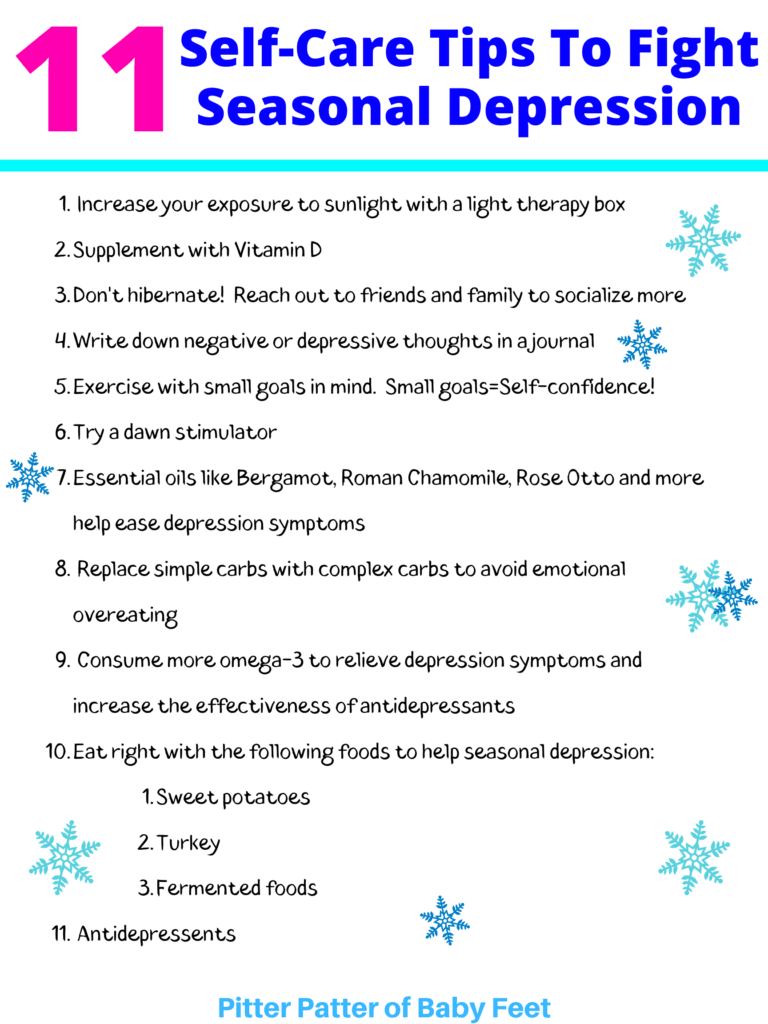Winter is coming! This is not just a catchy statement from House Stark on Game of Thrones. It’s a forewarning for seasonal depression.
Seasonal Affective Disorder (SAD) is a form of depression that typically occurs during the fall and winter months.
While the cause is unknown, many believe a decrease in daylight hours disrupts serotonin and melatonin levels causing a dramatic shift in mood.
Seasonal depression is a tricky disorder. While someone cannot have depression all year long, suddenly they are suffering from depression for a season.
It can be very frustrating to deal with and manage the effects of SAD. But there’s always hope!
Although the days are shorter and darker, there are things you can do to manage depression symptoms even in the darkest of days!
Disclosure: Bear in mind that some of the links in this post are affiliate links and if you click on them to make a purchase I will earn a commission. Keep in mind that I link these companies and their products because of their quality and not because of the commission I receive from your purchases. The decision is yours, and whether or not you decide to buy something is completely up to you.
Who Develops SAD?
Interestingly enough, seasonal depression is more likely to affect women than men and is rarely seen in anyone under the age of 20.
Not surprisingly, the further north you travel in the hemisphere the more likely you are to meet someone with seasonal depression.
In the United States, 6% of people are affected yearly by this form of depression.
But how does this subtype of depression differ from major depression?
Symptoms Of Seasonal Depression
The symptoms for seasonal depression and major depression are much the same.
But there are a few symptoms that are more common with SAD.
Major And Seasonal Depression Symptoms:
-Feeling down
-Feelings of hopelessness or worthlessness
-Low energy
-Sleep issues (insomnia or sleeping too much)
-Appetite changes
-Agitation
-Troubles concentrating
-Loss of interest in things once loved
-Thoughts of death or suicide
Common Symptoms Of Winter SAD:
-Weight gain
-Carbohydrate cravings
-Overly tired (daytime drowsiness; extra time sleeping)
-Low energy
Related Articles: 10 Ways To Manage Holiday Stress This Year
8 Lies Your Anxiety Is Telling You
8 Reasons For Motherhood Loneliness
Self-Care Tips
Increase Sunlight
Sunlight is hard to come by during the winter months. With decreased levels of sunlight comes decreases in serotonin, the feel-good happiness chemical.
But you can’t simply walk outside and soak up some sun.
Thankfully, seasonal depression can be treated with artificial sunlight.
A light therapy box will increase your mood along with focus and can promote sleep regulation. It works by mimicking natural sunlight without the use of UV rays.
A simple 15 minutes a day during the morning is sufficient enough to help ease depression symptoms.
But you can always find the right time of day and for how long to use a light therapy box by discussing it with your doctor.
He or she will be able to suggest the best length of time to improve seasonal depression symptoms specific to you.

Supplement
According to a 2006 study conducted by the Center For Disease Control, it was found that one-fourth of the population was suffering from vitamin D deficiency.
One reason for this staggering number is the theory that generations today are spending less time outside.
Vitamin D, also called “the sunshine vitamin” is absorbed through the skin from ultra-violet rays of the sun.
It serves the important function of calcium and phosphorus regulation along with building strong bones.
But studies have found vitamin D serves another important function: Improving mood.
Canadian researchers analyzed 14 different studies with over 30,000 participants and found a positive connection between depression and vitamin D levels.
The lower the vitamin D levels were in a participant, the more likely they were to develop depression.
While there’s a strong link between the two, it should be noted that not every person with vitamin D deficiency will develop depression nor will their depression be relieved due to vitamin D supplementation.
However, since winter months are approaching quickly and the lack of sunshine becomes greater you may want to think about increasing your intake of vitamin D.
Vitamin D is found rarely in foods, so it is best to consume the vitamin in pill or liquid supplementation form.
Another option is to supplement with turmeric.
Research found when individuals supplemented with 1,000 mg’s of curcumin compared to a placebo group, turmeric was found to be successful in alleviated depression symptoms.
Socialize
Since one of the typical symptoms of seasonal depression is “hibernating,” it’s important to put increased socialization on your self-care list.
Socializing with other people is essential for continuing your mental health throughout the winter months.
A close friend or family member may be just the thing you need to left your mood.
Schedule time with others to meet up for coffee, go out to dinner, see a movie… Whatever gets you out of the house and out of “hibernation” mood.
Remember that depression feeds off of isolation. The more you isolate from outside human interaction, the more your depression will worsen.

Start A Journal
Journaling alone is its own form of therapy.
If you’ve never had a journal before, it can be both liberating and beneficial to your mental health.
Journaling allows you to take all your built-up emotions and communicate them through writing.
Just think of it as a form of therapy, except you won’t have to worry about the fear of judgment because no one else will be reading it.
A journal is a perfect way to work through thoughts and emotions that may be aiding seasonal depression.
Yes, you can even address repressed emotions through writing as long as you’re honest and open with yourself.
Exercise
Exercise not only has many benefits to the physical body but to your mental state as well.
But how do you begin an exercise regimen when seasonal depression causes exhaustion and lack of interest?
You start by setting achievable goals for yourself.
Don’t start by setting goals that you can’t complete.
You know the odds of you completing a five-mile run on the treadmill is an exaggerated goal if you’re beginning an exercise program.
However, walking one mile is more attainable.
If you set your goals too high, you will end up disappointed with yourself which will only worsen seasonal depression.
Small goals=Self-confidence.
In addition to gaining confidence, your brain chemistry changes. A study conducted by Harvard T. H. Chan School of Public Health discovered that just 15 minutes of running or an hour of walking reduced depression by 26%.
To fight against depression, exercise triggers the brain to release endorphins to give you energy and lift your mood.
If happiness hormones are not enough to make you want to exercise that think of an exercise program this way: It provides a distraction/escape from everyday problems that may be contributing to your seasonal depression.
Here are some at-home exercises to beat seasonal depression:
-Dancing
-Stair stepping (use a sturdy chair or plastic stair steps)
-Lunges
-Squats
-Resistance training
–Weight training
-Shoveling snow (yes, it is considered exercise even if you hate it)
-Travel
If you’re suffering from seasonal depression, it may just be time to take a vacation. Leave the gloomy skies behind you and think of warmer weather.
Although we can’t always afford a vacation as nice as Hawaii or Bali, you will want to travel someplace sunnier than where you live.
This may be just the thing you need to take a break from winter blues.
Dawn Simulator
A dawn simulator is a form of light therapy that’s used during the fall and winter months to treat seasonal affective disorder (SAD).
Instead of hearing an alarm to wake up, a dawn simulator produces a gradually brighter natural light to stimulate wakefulness similar to a sunrise.
This type of alarm clock is perfect for warding off excessive tiredness which is a typical symptom of seasonal depression.
Related Articles: 12 Products For Moms Guaranteed To Relieve Stress
The Best Self-Care Tips To Relieve Stress
Tips For Controlling Anxiety Around Your Children
Essential Oils
Essential oils are an age-old natural remedy for a variety of illnesses.
Although some individuals don’t believe they are effective, research studies are proving otherwise.
In animal research studies, essential oils showed signs of relieving the mental and physical symptoms of depression.
While animals do not possess the complex brain of human beings, it is worth mentioning that animal studies don’t normally yield significant results.
According to a 2016 human study, researchers found the following essential oils to be the most effective in treating depression symptoms:
–Bergamot
-Roman Chamomile
–Geranium
-Sage
-Rosemary
-Jasmine
-Lavender
–Yuzu
–Rose Otto
The same report also concludes that while you can inhale the above essential oils, the most symptom improvement was found when applied topically as a massage oil.
To use essential oils topically, it’s important to note that the oils must be mixed with a carrier oil like almond or coconut oil.
By themselves, essential oils on the skin can cause irritation.
Eat Right
When you want to relieve seasonal depression, it’s important to eat the right foods.
This is hard to due during the winter months since one of the symptoms of depression is craving carbohydrates.
But if you indulge in too many carbohydrates you could be emotionally eating to relieve your depression.
Then you’re in a vicious cycle of feeling depressed and relying on food to make yourself feel better.
To fuel your body and boost your mental health this winter substitute simple carbs (white bread, cupcakes, cookies, etc.) for complex carbs.
Complex carbs are carbohydrates that provide extra nutrients like fiber.
Some examples of complex carbohydrates include:
-Oats
-Barley
-Wild rice
-Kidney beans
-Chickpeas
-Quinoa
Along with complex carbohydrates to still satisfy your carbohydrate craving during winter, you may need to add foods that fight depression. Some foods are known for fighting depression.
Try to add some of the following nutrients or foods to your winter diet!
Fatty Acids
Research shows that omega-3 fatty acids are known for boosting brain function, but they have also shown to help depression symptoms.
An easy way to add extra omega-3’s to your diet is by adding small amounts of flaxseed oil or coconut oil.
But remember that too much oil can really pack on the calories.
Similar studies have also found that omega-3 is able to boost the effects of depression medication.
Other healthy forms of fatty acids include:
-Fatty fish like salmon
-Nuts (almonds, cashews, peanuts, etc.)
-Dark green leafy vegetables like kale and spinach
-Dark Chocolate
Who doesn’t love chocolate! Now you have an excuse to eat more chocolate because cocoa contains powerful antioxidants called flavonoids that boost mood.
In a U.S. research study, women who consumed high amounts of flavonoids lowered their risk of depression.
Sweet Potatoes
Sweet potatoes are in abundance around fall and winter times, so it makes it a perfect food for fighting seasonal depression.
Similar to cocoa beans, sweet potatoes, carrots and squash are orange in color due to the antioxidant carotenoids.
A six-year Italian research study found that men and women with lower blood levels of carotenoids also experienced an increase in depression symptoms.
Another study in the United States found that high levels of carotenoids were associated with increased optimism.
Although the study didn’t find why the antioxidants increased optimism, it’s still all the more reason to indulge in these fall and winter foods.
Turkey
Another favorite holiday food, turkey is known for making us tired. But that specific chemical (tryptophan) that makes you tired also lifts depression.
When turkey is consumed, tryptophan plays the role in releasing the hormone serotonin, which is responsible for uplifting your mood.
While you can take tryptophan in supplement (pill) form compared to eating a ton of turkey…
Always discuss it with your doctor.
Tryptophan supplements are known to cause horrible side effects when combined with certain medications.
If you’re not a turkey fan, the chemical tryptophan can also be found in eggs, fish, dairy and seeds.
Fermented Foods
Personally, I’m not a fan of fermented foods, but some studies have shown a connection between fermented foods and depression.
The reason why is fermented foods are full of probiotics, the good bacteria in your gut.
To aid depression, good digestive bacteria can boost the hormone serotonin, which is made in the gut.
While it still remains more of a theory than scientifically proven, many believe that gut health and brain function specifically mental health are connected.

Antidepressants
I list antidepressants as the last option on this list because many individuals want to try everything else before being prescribed antidepressants for seasonal depression.
Although seasonal depression doesn’t occur all year round, antidepressants can still offer you the symptom you need during the darker months of the year.
To treat the symptoms of seasonal affective disorder you need to be diagnosed by a healthcare professional and prescribed an antidepressant.
Be aware antidepressant medication is not a ‘magic pill’ that will lift depression symptoms overnight.
Antidepressants typically take a couple weeks to alleviate symptoms.
Because of this, antidepressants are sometimes prescribed and started before darker weather changes occur.
If you have tried everything else for seasonal depression and you’re still living with symptoms, there is no shame in taking medication for relief.
Talk to your doctor if the natural ways of helping seasonal depression are not working for you.
Related Articles: How To Handle Love Bombing In A New Relationship
How Antidepressants Help Me With Parenting Struggles
50 Things To Do When Depression Hits Hard
Final Thoughts
Even though you may not suffer with seasonal depression all year round, it is no less difficult to deal with. Seasonal depression has a way of sneaking up on someone.
Once the days become shorter and the darkness gets longer, it’s no wonder many people have seasonal depression each year.
But seasonal depression, just like major depression has to be dealt with.
You can find ways to manage season depression by using light therapy or dawn simulators. This is a nice natural way to alleviate depression symptoms.
Anything you can do to aid to your self-care will help depression.
Of course, another option for seasonal depression is therapy and/or antidepressant medications.
If you have tried all of the above options and you’re still seeing life in a negative and gloomy light, it may be time to talk to your doctor about taking medication.
While you may need depression medication during the fall and winter months, some individuals find they can taper off of the medication when spring rolls around.
But this needs to be done under the guidance and supervision of your doctor who is familiar with antidepressants.
If you suffer from seasonal depression, know that you’re not alone!

Works Cited
Season affective disorder
12 ways to ease SAD
The mental health benefits of exercise
10 best indoor at home exercises

